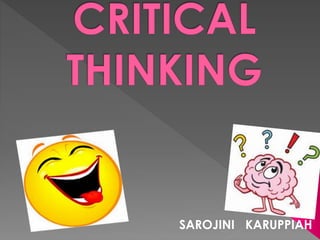Report
Share

Recommended
Recommended
More Related Content
What's hot
What's hot (20)
How to Deal with Anger, Frustration and Resentment

How to Deal with Anger, Frustration and Resentment
Similar to Critical thinking c1
Similar to Critical thinking c1 (20)
THE NEED FOR EVIDENCE Almost all reasoning we encounter includes bel.docx

THE NEED FOR EVIDENCE Almost all reasoning we encounter includes bel.docx
Chapter 3Evaluating Moral ArgumentsWhat Is Moral Reasoning.docx

Chapter 3Evaluating Moral ArgumentsWhat Is Moral Reasoning.docx
Critical thinking c1
- 5. Thinking critically is a defense against a world of too much information and too many people trying to convince us. Examples :- You should go to bed early? You should go to this college? You should take this course?
- 7. 3 types of convincing? Someone tries to convince you. You try to convince someone else You try to convince yourself
- 8. Critical thinking can :- improve your thinking skills sharpen your judgement and show you that methods of evaluating reasoning apply to much in your life.
- 9. Claims -A declarative sentences used in such a way that it is true or false, but not both. (in contrast to threats, commands, questions and prayers). Examples: declarative sentences This course is a delight. The author of this book sure writes well. Examples: not declarative sentences Shut that door! How often do I have to tell you to wipe your feet before you come into the house?
- 10. But not every declarative sentences is true or false. Those sentences that are true or false, named as truth-value
- 13. An arguments is an attempt to convince someone that a particular claims, called the conclusion is true. The rest of the arguments is called as premises ( that are given as the reasons for believing the conclusion is true)
- 14. Analysis : The nurse is making an argument. She’s trying to convince the doctor that “Your patient in Room 47 is dying” is true. She offers the premise: “He’s in cardiac arrest.” Sounds pretty convincing.
- 15. Analysis : Dick is making an argument, trying to convince the police officer that the following claim is true: “The accident was not my fault” (reworded a bit). He uses two premises: “She hit me from the rear” and “Anytime you get rear-ended it’s not your fault.”
- 16. Critical thinking is evaluating whether we should be convinced that some claims is true or some arguments is good, as well as formulating good arguments.
- 17. An argument, we decided, should mean an attempt to convince someone that a sentence is true. We defined a claim as a declarative sentence used in such a way that it is true or false. Arguments are attempts to convince that use only claims.
- 18. CRIME AMONG TEENAGERS INCREASED BECAUSE OF INFLUENCE FROM MOVIES OR FRIENDS PRIVATE JOB ? OR GOVERNMENT JOB? WHICH ONE YOU PREFER?
